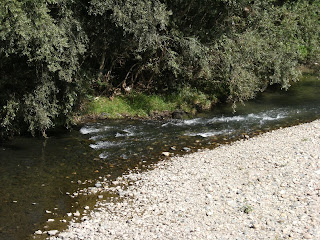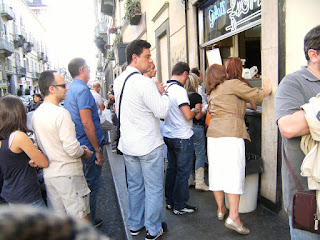-- Friedrich Nietzsche
“Turin is the most boring city in the world.”
-- Gustav Flaubert

My two week-visit to this well-marbled city began here. Blog-wise, it ends on this page.
No sentimentality here. None that I will admit to, anyway. How about some practicality instead? Honestly, not much has been written about Turin, that I can find. The guidebooks are predictably clever and manic, mostly geared toward the 2006 Winter Olympics. “Time Out Turin” is smart and comprehensive, but badly needs an update. Eugenia Bell’s “A Civilized Traveller's Guide to Turin” is a fine read, but her excursions always revolve around the quest for “a nice lunch.” “A House on Hill” by Cesare Pavese describes Turin in the last days of the war. Lesley Chamberlain’s “Nietzsche in Turin: The End of the Future” describes the writer's annus mirabilis in the city. Haven’t read it; looks good.
If you‘ve got Internet access, an excellent trip planner can be found here. Where to find buses, trams, how to get places, how long it will take, etc. The best public-transit deal, to my mind, is the carnet of 15 tickets called a Biglietti Urbano, costing 13.50. (QUINN-dih-chee is how you say “fifteen.” Billy-EHT-ee is how you say “tickets.” Practice!) You can get them at most newstands and tabacchi shops. (Think “wacky tabacky“; hold the “wacky.”) The more expensive three-, five-, and seven-day Torino Passes are probably good, too, if you don’t mind the implicit time pressure. Museum admissions are included with those. If you want to get away, Sassi/Superga, Chieri and Ivrea can be reached without a car for a euro or two.

One of my last-day rituals consists of writing a phony inscription inside the cover of the cheap book I’ve been reading on the road, and then sliding the book into my host’s bookcase. Last year while in Berlin I carried with me a historical novel about the Battle of the Bulge and the Nazis’ eventual liquidation. The next person to open it will see the following: “To Peter: The lousy Krauts had it coming. (signed, the author).” This year the book is “The Comfort of Strangers” by Ian McEwan, who was kind enough to write, “To Peter: Thanks for the ‘creaking chair’ metaphor. Brighton in April? --Ian.” It now stands innocently on Adriano’s shelf between Sergio Mariotti’s “Primi Passi Negli Scacchi” and Autori Vari’s “Parigi, Ville Noire,” ready to ambush some English-starved tourist someday. I’ve been doing this my entire adult life.

If beauty and sadness are two sides to the same coin, Turin is a city of … a lot of coins. I’ve seen murderous road rage, and parents who whack their kids on the head for walking too far in front of them. I’ve seen a tuxedoed waiter deliver a demitasse of caffe to a beggar sitting cross-legged on the sidewalk. And everywhere, middle-aged men dote on their elderly mothers. One day I asked a skateboarder how to get to Piazza Something, and he pulled a school map out of his backpack, showing me street by street where I needed to go. Folding it up and smiling, he handed it to me. “Keep it! Prego!”

Most nights around 6:30 as I stand on my balcony, a mother and daughter walk below me toward the grocery store. The girl is blond, has glasses with clear frames and usually wears a purple track suit. She shuffles alongside her mother, her toes pointed outward, and even though she’s about 15, she never lets go of her mom’s hand. One day, two old women in the median of Corso Turati greeted her warmly and kissed her on the cheek.
I hope the shirt fits, I-Bot. I’m sorry I’ve been away so long. When I tell you about all the amazing places I’ve seen, I hope you’ll overstand.
End
last.day.in.turin from Sluggh McGee on Vimeo.






















































